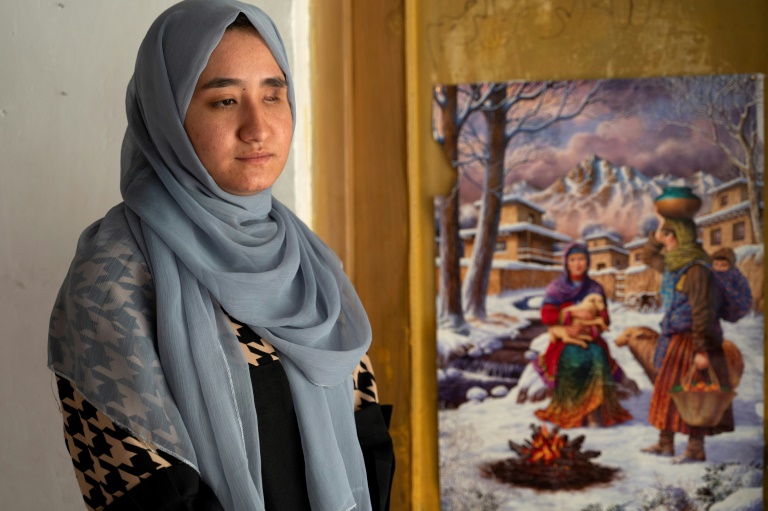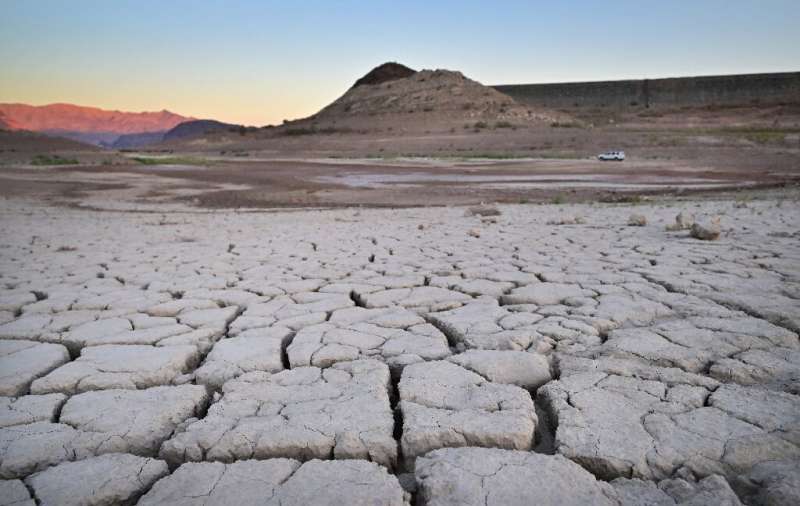On Monday morning, as world leaders were gathering for the COP27 climate summit in the Egyptian resort of Sharm el-Sheikh, Laila Soueif arrived at the Wadi el-Natrun prison north of Cairo to see her son, Alaa Abdel Fattah, one of Egypt’s most prominent human rights activists.
Her 40-year-old imprisoned son stopped drinking water on Sunday, escalating a hunger strike that has lasted seven months in a desperate campaign for his release.
Soueif – a mathematics professor who is also a leading human rights activist – arrived at the prison with books, letters, and a clean set of clothes for her son. But by noon local time, she sounded resigned about her prospects of meeting her son.
“I won’t see him today,” she told FRANCE 24 in a phone interview from the waiting area for family members outside the prison gates. “There is no visit scheduled. I’m waiting here, I’m hoping to get a Letter
The last letter Soueif received from Fattah was on Monday, October 31, informing the family that if he was not released, he would stop drinking water on Sunday, November 6, the day the COP27 summit opened.
Fattah, who was one of the leading youth leaders during the 2011 Arab Spring, started a hunger strike in prison on April 2, initially ingesting only water and salt. He later kept his calory intake at 100, a starvation level far below the daily 2,000 calories needed by the human body.
Already weakened and emaciated following his seven-month hunger strike, Fattah was effectively stating he was willing to pay with his life for liberty. It’s an ultimate price that Fattah is also shouldering to highlight the plight of thousands of people – including human rights defenders, journalists, students, opposition politicians and peaceful protesters – detained in Egypt’s jails.
This latest act of protest has sparked a media storm amid calls for his release by top human rights defenders.
Amnesty International Secretary-General Agnès Callamard on Sunday warned that the proceedings at COP27 would be stained if Egyptian authorities were faced with Fattah’s death in custody. “If they do not want to end up with a death they should have and could have prevented, they must act now,” she said.
Callamard was speaking to journalists in Cairo, where she also met Soueif in the family home. “Mother Courage. Inspiring. Moving,” tweeted Callamard with a photograph of the Amnesty International chief holding Soueif’s hand in a display of solidarity.
Family on the frontlines of the fight for human rights
Benevolence, compassion and a respect for basic human rights are not attributes associated with the Egyptian state, particularly after President Abdel Fattah al-Sisi assumed office in 2014 following a vicious crackdown on Muslim Brotherhood supporters. In October 2021, Egypt’s army chief-turned-president announced the lifting of a state of emergency. But within days, the country’s parliament approved laws broadening the scope of military tribunals and the definition of “fake news”.
An Egyptian and British dual national, Fattah has spent much of the past decade behind bars on various charges. His latest arrest, on October 29, 2021, came just six months after being released from a five-year prison term and while he was still on probation.
His next five-year sentence, the one he is currently serving, is for “spreading false news undermining state security”. Fattah’s offense was to retweet a post condemning prison conditions in Egypt.
The irony of sentencing a former prisoner on “false news” charges for a statement on jail conditions appeared to be lost on Egyptian authorities.
But then Fattah and his family know a thing or two about Egypt’s prisons and justice system.
His late father, Ahmed Seif el-Islam, an eminent human rights defender and lawyer, was in and out of jail since the 1970s. His last detention was in 2011, just three years before his death aged 63.
Fattah’s sister, Sanaa Seif, was arrested in 2014 while protesting against Egypt’s anti-demonstration law. She was released a year later only to be detained again in June 2020 as she was trying to file an assault complaint at the public prosecutor’s office. Following her release, she staged sit-ins outside the British Foreign Office in London calling for her brother’s release. On Monday, Sanaa Seif landed in Sharm el-Sheikh to campaign for her brother’s release.
His other sister, Mona, is also a human rights activist.
“Alaa comes from a family of Egyptian activists who have always stood up to authorities,” explained Souleimene Benghazi, Amnesty International’s Egypt campaigner. “It definitely looks like Egyptian authorities are determined to make him pay for his activism.”
New prison complex, old violations
Several human rights campaigners have criticised the decision for Egypt to host COP27, citing “rampant crimes under international law and other serious human rights violations committed with impunity”, according to an Amnesty International report released in September.
The report came a year after the Egyptian government launched a National Human Rights Strategy (NHRS) at an event attended by President Sisi, who extolled the progress made by his administration in upholding existing legal and constitutional guarantees.
Days later, the government opened the Badr and Wadi el-Natrun prison complexes, which was hailed as an effort to modernise Egypt’s prisons. Fattah and several other prisoners were transferred from Egypt’s ill-reputed Tohra prison complex to the new facilities.
The gloss and spin have failed to convince human rights defenders as well as families of prisoners detained for expressing dissent. In its 48-page report, Amnesty International noted that the NHRS “presents a deeply misleading and at times outright false picture of the human rights situation in Egypt”.
British PM promises to raise issue with Sisi
Fattah’s case is one of the most high-profile detention cases in Egypt, with British Prime Minister Rishi Sunak promising, in a November 5 letter to Sanaa Seif, that it was a priority for his government.
"I will continue to stress to President Sisi the importance that we attach to the swift resolution of Alaa's case and an end to his unacceptable treatment," Sunak wrote.
On Monday, Sunak's office said the prime minister had stressed his "deep concern" over the case of Egyptian-British hunger striker Alaa Abd el-Fattah during a meeting with Egyptian President Abdel Fattah al-Sisi at the COP27 summit.
"The prime minister raised the case of Alaa Abd el-Fattah, stressing the UK Government's deep concern on this issue," Downing Street said in a readout of the meeting between Sunak and Sisi at the summit in Sharm el-Sheikh.
"The prime minister said he hoped to see this resolved as soon as possible and would continue to press for progress."
Greenwashing human rights
The Egyptian government’s failure to act on the case of a dual national from a prominent activist family raises questions on the fate of other prisoners who do not have the sort of agency and international attention that Fattah’s detention has attracted.
It has also raised questions on the intersection of human rights and climate justice in an age when the global environmental crisis requires the engagement of all governments.
In his welcome address on the COP27 official website, Sisi has promised that, “Egypt will spare no effort to ensure that COP27 becomes the moment when the world moved from negotiation to implementation and where words were translated to actions, and where we collectively embarked on a path towards sustainability, a just transition and eventually a greener future for coming generations.”
The rhetoric has failed to convince most human rights defenders. “Egyptian authorities are using international events to greenwash their human rights record,” said Benghazi. “Ahead of COP27, they were trying to show the international community that they’re working on improving their human rights record. It’s a PR exercise for them, it’s not genuine when thousands of people are detained for exercising their right to free speech, freedom of association and their right to fair trials.”
Following Fattah’s decision not to drink water, Egyptian officials have not responded to journalist’s requests for comment. In earlier comments, the government has noted that he was moved to the new Wadi el-Natrun prison complex, which has better conditions.
The government’s failure to respond to Fattah’s case even as it is thrust into the spotlight with the COP27 summit comes as no surprise to experts familiar with Egypt. “It’s really hard to give an opinion on how Egyptian authorities are working or not working on Alaa’s case,” said Benghazi. “I can only say that they are really trying to push the whole family.”
But Laila Soueif is not a woman to be pushed around. During past visits to her jailed son, the indomitable math professor and human rights campaigner explained that she kept her emotions in check. “I keep my reactions to a minimum. We have only 20 minutes, we’re separated by a glass, the conditions are not easy. I listen to him, I take notes, and I tell him that whatever he decides, we will support him.”
With campaigners such as Callamard warning that it’s just a matter of days for Egyptian authorities to act on Fattah’s case before it’s too late, Soueif is still keeping her emotions in check as she battles for her son’s release. “I’m very worried,” she explained on a phone call from the Wadi el-Natrun prison waiting centre. “I’m also very proud that what he’s doing has resonated so much and has put so much focus on the state of prisoners and human rights here.”










